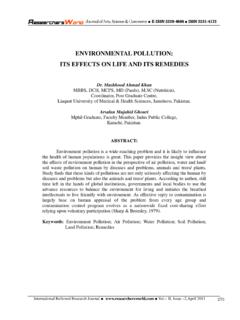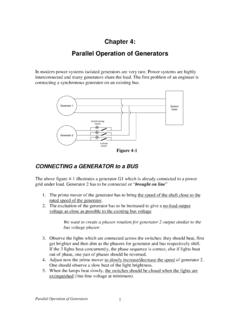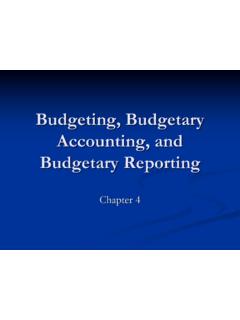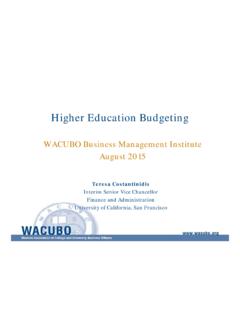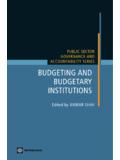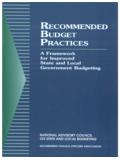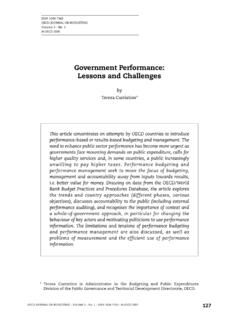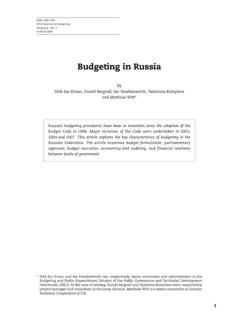Transcription of 19 BUDGETARY CONTROL BUDGETING AND - …
1 INTRODUCTION TOBUDGETSB usinesses need to plan for the future. In large businesses such planning is very formal while, forsmaller businesses, it will be less formal. Planning for the future falls into three time scales: long-term: from about three years up to, sometimes, as far as twenty years ahead medium-term: one to three years ahead short-term: for the next yearClearly, planning for these different time scales needs different approaches: the further on in time, theless detailed are the plans. In the medium and longer term, a business will establish broad businessobjectives. Such objectives do not have to be formally written down, although in a large businessthey are likely to be.
2 In smaller businesses, objectives will certainly be considered and discussed bythe owners or managers. Planning takes note of these broader business objectives and sets out howthese are to be achieved in the form of detailed plans known as this chapter we are concerned with planning for the more immediate future, ie the next financialyear. BUDGETING is used by businesses as a method of financial planning for thefuture. Budgets are prepared for main areas of the business purchases,sales (revenue), production, labour, trade receivables, trade payables, cash and provide detailed plans of the business for the next three, six or twelvemonths.
3 The focus of this chapter is the cash this chapter we shall be examining: the benefits of budgets and BUDGETARY CONTROL the limitations of budgets and BUDGETARY CONTROL the preparation and use of cash budgetsBUDGETING ANDBUDGETARY 03/07/2012 11:57 Page 362 WHAT IS ABUDGET?A budget is a financial plan for a business, prepared in budget may be set in money terms, eg a sales budget of 500,000, or it can be expressed in termsof units, eg a purchases budget of 5,000 units to be can be incomebudgets for money received, eg a sales budget, or expenditurebudgets formoney spent, eg a purchases budget. The budget we shall be focusing on in this chapter is the cash budget, which combines both incomeand expenditure, estimating what will happen to the bank balance during the time period of budgets are prepared for the next financial year (the budget period), and are usually brokendown into shorter time periods, commonly four-weekly or monthly.
4 This enables BUDGETARY controlto be exercised over the budget: the actual results can be monitored against the budget, anddiscrepancies between the two can be investigated and corrective action taken where OFBUDGETS ANDBUDGETARYCONTROLB udgets provide benefits both for the business, and also for its managers and other staff:the budget assists planningBy formalising objectives through a budget, a business can ensure that its plans are achievable. It willbe able to decide what is needed to produce the output of goods and services, and to make sure thateverything will be available at the right budget communicates and co-ordinatesBecause a budget is agreed by the business, all the relevant managers and staff will be workingtowards the same end.
5 When the budget is being set, any anticipated problems should be resolved and any areas of potentialconfusion clarified. All departments should be in a position to play their part in achieving the budget helps with decision-makingBy planning ahead through budgets, a business can make decisions on how much output in the formof goods or services can be achieved. At the same time, the cost of the output can be planned andchanges can be made where and BUDGETARY CONTROL 03/07/2012 11:57 Page 363364AS accounting for AQAthe budget can be used to monitor and controlAn important reason for producing a budget is that management is able to use BUDGETARY CONTROL tomonitor and compare the actual results (see diagram below).
6 This is so that action can be taken tomodify the operation of the business as time passes, or possibly to change the budget if it budget can be used to motivateA budget can be part of the techniques for motivating managers and other staff to achieve theobjectives of the business. The extent to which this happens will depend on how the budget is agreedand set, and whether it is thought to be fair and achievable. The budget may also be linked to rewards(for example, bonuses) where targets are met or OFBUDGETS ANDBUDGETARYCONTROLW hilst most businesses will benefit from the use of budgets, there are a number of limitations ofbudgets to be aware of:the benefit of the budget must exceed the costBudgeting is a fairly complex process and some businesses particularly small ones may find thatthe task is too much of a burden in terms of time and other resources, with only limited , many lenders such as banks often require the production of budgets as part of thebusiness plan.
7 As a general rule, the benefit of producing the budget must exceed its information may not be accurateIt is essential that the information going into budgets should be as accurate as possible. Anybody canproduce a budget, but the more inaccurate it is, the less use it is to the business as a planning andcontrol mechanism. Great care needs to be taken with estimates of sales often the starting point ofthe BUDGETING process and costs. BUDGETARY CONTROL is used to compare the budget against whatactually happened the budget may need to be changed if it becomes FIGURESCONTROL ANDACTUAL FIGURESTAKE ACTIONMONITOR AND 03/07/2012 11:57 Page 364the budget may demotivateEmployees who have had no part in agreeing and setting a budget which is imposed upon them, willfeel that they do not own it.
8 As a consequence, the staff may be demotivated. Another limitation isthat employees may see budgets as either a carrot or a stick , ie as a form of encouragement toachieve the targets set, or as a form of punishment if targets are may lead to disfunctional managementA limitation that can occur is that employees in one department of the business may over-achieveagainst their budget and create problems elsewhere. For example, a production department mightachieve extra output that the sales department finds difficult to sell. To avoid such disfunctionalmanagement, budgets need to be set at realistic levels and linked and co-ordinated across alldepartments within the may be set at too low a levelWhere the budget is too easy to achieve it will be of no benefit to the business and may, in fact, leadto lower levels of output and higher costs than before the budget was established.
9 Budgets should beset at realistic levels, which make the best use of the resources AREPREPARED?Budgets are planned for specific sections of the business: these budgets can then be controlled by abudget holder, who may be the manager or supervisor of the specific section. Such budgets include: purchases budget what the business needs to buy to make/supply the goods it expects to sell sales (revenue) budget what the business expects to sell production budget how the business will make/supply the goods it expects to sell labour budget the cost of employing the people who will make/supply the goods trade receivable budget how much the business will receive from credit sales trade payable budget how much the business will pay for credit purchases cash budget how much money will be flowing in and out of the bank accountThe end result of the BUDGETING process is often the production of a master budget.
10 Which takes theform of forecast operating statements forecast income statement and forecast balance sheet. Themaster budget is the master plan which shows how all the other budgets work together . Note that, in this chapter, we focus our attention on the cash budget; you will examine the otherbudgets, including the master budget, if you go on to study A2 and BUDGETARY CONTROL 03/07/2012 11:57 Page 365 BUDGETARYPLANNINGMany large businesses take a highly formal view of planning the budget and make use of: a budget manual, which provides a set of guidelines as to who is involved with the budgetaryplanning and CONTROL process, and how the process is to be conducted a budget committee, which organises the process of BUDGETARY planning and CONTROL .
